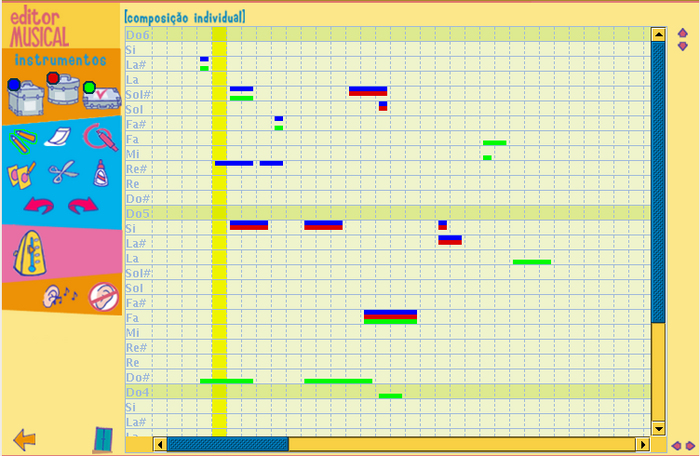Musical Editor: Difference between revisions
Jump to navigation
Jump to search
m (added Translation template) |
(Link to download) |
||
| Line 1: | Line 1: | ||
{{Translation | lang = en | source = Editor Musical | version = 35349}} |
{{Translation | lang = en | source = Editor Musical | version = 35349}} |
||
{{Status box |
|||
|icon= |
|||
|activity=Musical Editor |
|||
|status=Demonstration |
|||
|version=1.3 |
|||
|base=unknow |
|||
|source=unknow |
|||
|contributors=NATE-LSI |
|||
}} |
|||
== Download Demo Version == |
|||
Download here: http://code.google.com/p/editor-musical/downloads/list |
|||
After unpacking the file, go to "MusicalEditor.activity" directory and read README to know how to procedure. |
|||
== The Application == |
== The Application == |
||
Revision as of 17:00, 5 June 2007
| Musical Editor | |
| [[Image:|center]] | |
| Status: | Demonstration |
| Version: | 1.3 |
| Base: | unknow |
| Source: | unknow |
| l10n: | missing |
| Contributors | |
| NATE-LSI | |
Download Demo Version
Download here: http://code.google.com/p/editor-musical/downloads/list
After unpacking the file, go to "MusicalEditor.activity" directory and read README to know how to procedure.
The Application
The Musical Editor is a musical software that allows children to learn how to develop their own compositions.
It has been developed by LSI (Integrated Systems Laboratory)
LSI is a Brazilian institution that has developed applications to support Education and has created some teams to work on OLPC software development.
These teams are rewriting some Java applications in Python.
One of these applications is the Musical Editor.
Features
- Easy to use
- No limitation on quantity of instruments
- Currently, the composition mode is unique (Grid Mode), however it's probable that new modes integrate the software
- Each instrument belongs to a group (for example, the group of string instruments), each group has a specific color.
Thus, the user can associate the color to the group of the instrument and will notice that each group has a role in music.
- The application runs in mono-user or collaborative mode (using the mesh network)
- We will try to implement a way of recording sounds from the internal microphone of OLPC
Team
- Alexandre Martinazzo
- Bruno Fialho Marques Gola
- Gustavo Rocha Dias
- Joyce Alessandra Saul
- Irene Karaguilla Ficheman
- Oswaldo Bassani Neto
- Rafael Barbolo Lopes
- Roseli de Deus Lopes
Related Links
- Editor Musical -- Portuguese version of this page
